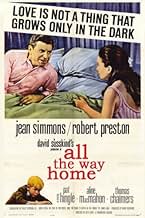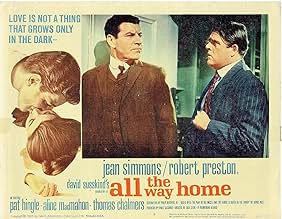Ajouter une intrigue dans votre langueMary Follet, a wife and mother in 1915 Tennessee, copes with the loss of her husband and the necessity of raising their children alone.Mary Follet, a wife and mother in 1915 Tennessee, copes with the loss of her husband and the necessity of raising their children alone.Mary Follet, a wife and mother in 1915 Tennessee, copes with the loss of her husband and the necessity of raising their children alone.
- Prix
- 1 victoire au total
Ferdi B. Hoffman
- Father Jackson
- (uncredited)
David Huddleston
- Small Part
- (uncredited)
Histoire
Le saviez-vous
- AnecdotesAccording to a 1986 Knoxville Journal article, Robert Preston was one of the few people involved in the production who knew how to drive the borrowed 1915 Model-T used in the film, and he wanted it to be used accurately. In one scene the director wanted to have the Model-T parked with the headlights on, but without the motor running. Those vehicles were not equipped with batteries, though, and electricity for lights was supplied by the running motor. The director wanted to have a battery hooked up to the car, but Preston refused, saying that Model-T buffs would notice the inaccuracy if the lamps were lit without the motor running.
- GaffesWhen Rufus runs out of the house towards the train, in one wide shot a busy road with modern vehicles is visible in the background.
- Citations
Rufus Follet: Rufus is a NIGGER name...
Jay Follett: Rufus is a powerful name... don't ever talk that way, that word is used to hurt colored people...
- ConnexionsReferenced in The Story of the Swimmer (2014)
Commentaire en vedette
Like some of the other commentators, I saw this movie when I was young -- perhaps 11 or 12. I was babysitting the boys next door in 1964, and I think it was on the old NBC Saturday Night at the Movies back in the 1960s. A few years later, I read James Agee's "A Death in the Family" and recognized it as the original source. But years, then decades, went by before I saw the film again.
I remember being entranced by the opening scenes, where I see a father taking his young son into a saloon ... doing the Charlie Chaplin dance ... then going home together. Years later (for me) I had buddies who rented rooms on Forest Street in Knoxville while they attended UT. They knew nothing of the book, nor how families there once lay down on cotton comforters on the grasse of the backside lawns to gaze at the stars. Heck, back in the late 1970s, I could even find in Knoxville the railroad yard and roundhouse mentioned in the book. Probably not now.
It's a wistful movie. Some photography and audio was a little too artful ... a departure from the main scenes. But, like everyone else, I cherished the scenes where Rufus spends time with his Aunt -- especially when he dons that outrageous cap.
You can learn things from movies. For me, an enduring lesson was gained when Robert Preston uses his hands to warm the sheets before his wife gets into bed. I did this for years on cold winter nights when I was a married man for 25 years ... and discovered, after divorce, how such a small act is still appreciated by others.
I also feel fortunate to have met Robert Preston in -- of all places -- the Richmond VA airport somewhere around 1980. Not your normal venue. But we were both trapped by planes diverted by a monster storm. We shared several drinks, he told hilarious stories -- but I stopped him (clearly) when I mentioned that All the Way Home was my favorite movie in which he was featured. "What? Not Music Man?" He feigned to be indignant ... but, perhaps because so few people even knew about this movie, or ever mentioned it to him, he realized I was sincere. He spoke of how much he enjoyed the story, made a few untoward comments about the director and Jean Simmons ... but he clearly liked the role he'd played. He was a very warm and charming and gracious man.
All the Way Home is a terrific movie ... so rare these days to see a film focused on family, love, and the ways youngsters see the world.
I remember being entranced by the opening scenes, where I see a father taking his young son into a saloon ... doing the Charlie Chaplin dance ... then going home together. Years later (for me) I had buddies who rented rooms on Forest Street in Knoxville while they attended UT. They knew nothing of the book, nor how families there once lay down on cotton comforters on the grasse of the backside lawns to gaze at the stars. Heck, back in the late 1970s, I could even find in Knoxville the railroad yard and roundhouse mentioned in the book. Probably not now.
It's a wistful movie. Some photography and audio was a little too artful ... a departure from the main scenes. But, like everyone else, I cherished the scenes where Rufus spends time with his Aunt -- especially when he dons that outrageous cap.
You can learn things from movies. For me, an enduring lesson was gained when Robert Preston uses his hands to warm the sheets before his wife gets into bed. I did this for years on cold winter nights when I was a married man for 25 years ... and discovered, after divorce, how such a small act is still appreciated by others.
I also feel fortunate to have met Robert Preston in -- of all places -- the Richmond VA airport somewhere around 1980. Not your normal venue. But we were both trapped by planes diverted by a monster storm. We shared several drinks, he told hilarious stories -- but I stopped him (clearly) when I mentioned that All the Way Home was my favorite movie in which he was featured. "What? Not Music Man?" He feigned to be indignant ... but, perhaps because so few people even knew about this movie, or ever mentioned it to him, he realized I was sincere. He spoke of how much he enjoyed the story, made a few untoward comments about the director and Jean Simmons ... but he clearly liked the role he'd played. He was a very warm and charming and gracious man.
All the Way Home is a terrific movie ... so rare these days to see a film focused on family, love, and the ways youngsters see the world.
- timroperco
- 27 août 2008
- Lien permanent
Meilleurs choix
Connectez-vous pour évaluer et surveiller les recommandations personnalisées
- How long is All the Way Home?Propulsé par Alexa
Détails
- Durée1 heure 37 minutes
- Couleur
- Rapport de forme
- 1.66 : 1
Contribuer à cette page
Suggérer une modification ou ajouter du contenu manquant

Lacune principale
By what name was All the Way Home (1963) officially released in Canada in English?
Répondre

























